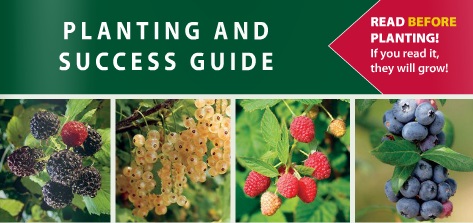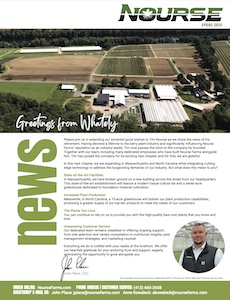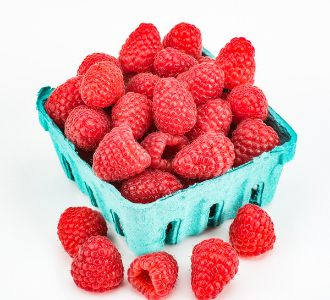Nourse Farms is pleased to offer our commercial growers the opportunity to bring Advanced Berry Breeding raspberries into your growing program. The minimum order quantity is 150 plants per variety. A non-propagation agreement must be signed before shipment.
The Licensing arrangements for these varieties will be more extensive than what we have traditionally handled:
- All commercial fruit producers must complete and sign a Fruit Producers License.
- Annual royalty payments will be collected on the linear meters of row under production.
- Quantities less than 5,000 plants can be planted without an Annual License Fee and Annual Royalty payments but do carry a plant royalty of $1.00 per plant. A detailed Non-Propagation Agreement must also be signed.
The following information about the varieties available through Nourse Farms is provided by Advanced Berry Breeding.
To order, contact us at info@noursefarms.com or call us at 413-665-2658.
Imara® U.S. Plant Patent #46031
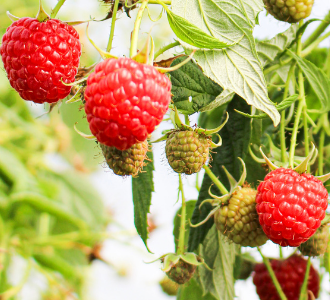
Imara® is a productive primocane raspberry variety with very high yield. The vigorous plants produce large conical fruit of good quality.
Imara® plants start production fairly early; the harvest period falls shortly after that of Polka by 10 days. When ripe, the fruit release easily, enabling easy and quick picking that results in a very efficient harvesting performance. The raspberries are red and shiny and have a good flavor. Shelf life is fairly good, as the fruit slowly darken after picking.
The plants form laterals easily and flower buds develop down almost the full length of the canes. To make picking easy and not too time consuming, it is important to limit the number of laterals. The resulting smaller crop size also enables a better fruit visibility. The plants are vigorous and have small dark red spines, which do not interfere with harvesting of the crop.
Just like Kweli®, Imara® has shown a low susceptibility to diseases up to now. Moreover, the variety seems to have a reduced vulnerability to red spider mite. The risk of an infection with fungal diseases can be reduced by using rain shelters.
Imara® is suitable for growing in a moderate climate, harvesting in late autumn or in winter. The fruit may darken relatively quickly in warm summer weather, limiting sales possibilities in that period.
Imara® is protected by Plant Breeders’ Rights and Trademark Rights. For production and sales of plants as well as raspberry cultivation, a license agreement is required.
Kwanza® U.S. Plant Patent #46030
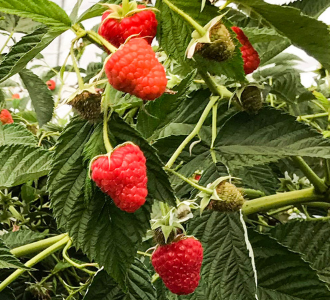
Kwanza® is a top-class raspberry. This primocane raspberry variety is distinguished by its very large fruit size and its bright orange red color. Other features are good flavor and excellent shelf life. A high yield and easy picking qualify Kwanza® as an exceptional variety.
Kwanza® is preferably grown in substrate, however most of the production in the U.S. is in soil. Kwanza® is very suitable for double cropping, which entails raspberry picking in autumn and in spring. Limitation of the number of canes per linear meter, creates an open crop with large fruit that allows quick picking, resulting in an excellent yield. Kwanza® starts production about three weeks after Polka. Kwanza® fruit are conical to round, moderately shiny, and weigh six to eight grams on average. To retain the quality of the fruit skin, careful picking is required and it is recommended to start picking not too early in the morning. The moisture tension in the plant cells will be lower in the later hours of the day and the fruit will release better. Once harvested, there is almost no color change and the quality remains good.
Important advice is to leave the plants fairly dry at night, which can be managed by stopping watering in the afternoon in a timely manner. Compared to other varieties, Kwanza® requires more calcium and less potassium, especially in the period up to harvest.
Kwanza® is suitable for growing in a moderate climate for the more experienced raspberry growers.
Kwanza® is protected by Plant Breeders’ Rights and Trademark Rights. For production and sales of plants as well as raspberry cultivation, a license agreement is required.
Kweli® U.S. Plant Patent #46041
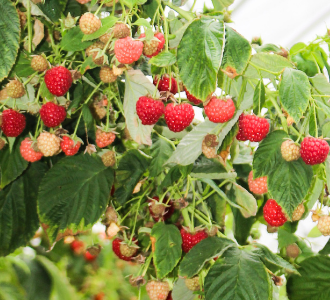
Kweli® is a versitile primocane raspberry variety that will produce fruit both in the fall and the spring. The variety is vigorous and gives high to very high yields. The fruit have an excellent shelf life, which enables transport over longer distances, thereby opening up new markets. This makes Kweli® a very attractive variety for many producers.
Kweli® produces round fruit with a beautiful raspberry color. The fruit can be harvested easily and release more readily when picked later in the day. The raspberries are dry, have a good flavor, and the fruit darken slowly after harvest, a shelf life of 10 days or more is the rule rather than the exception.
Kweli® is a mid-season variety, with a harvest period slightly later than that of Polka. The plants are vigorous and develop laterals at all levels. It is important to reduce the number of growing canes to keep the crop more open and compact. This makes the fruit more visible and accessible for picking. Kweli® has some eye-catching small green spines, but these do not interfere with picking.
Until now Kweli® has not shown any particular susceptibility to diseases. Possible infection with yellow rust (Phragmidium rubi-idaei) can easily be prevented by using control measures.
Kweli® is suitable for growing in a moderate climate. Since Kweli® tolerates high temperatures very well, this variety is also frequently used in dry tropical climates.
Kweli® is protected by Plant Breeders’ Rights and Trademark Rights. For production and sales of plants as well as raspberry cultivation, a license agreement is required.
Mapema® U.S. Plant Patent #27,182
Mapema® is an early fruiting and easy-to-grow primocane with a high yield. This variety produces large, conical fruit with a beautiful, deep color. The raspberries are of excellent quality and easy to pick.
Mapema® plants are very vigorous and robust. For easy fruit harvest, it is important to limit the number of laterals. This results in an open crop and consequently improves picking rates. It is recommended to keep the soil fairly dry at night to prevent the fruit from splitting.
Mapema® fruit release fairly easily when harvested. They are quite shiny, have an excellent flavor, and a fairly good shelf life.
Mapema® is particularly suitable for growing in areas with a moderate climate. Zones 5–9.
Mapema® is protected by Plant Breeders’ Rights and Trademark Rights. For production and sales of plants as well as raspberry cultivation, a license agreement is required.
Shani U.S. Plant Patent #PP31,552
An early primocane variety that thrives in low-light conditions, continuing to produce both flowers and raspberries. Topping the plants is crucial for vigor. Conical and medium red, these berries offer easy picking and extended shelf life.
Rafiki U.S. Plant Patent #PP31,550
A thorn-free primocane raspberry variety suitable for diverse growing regions, known for its high yield and ease of cultivation. Long-lasting, conical fruit endures extended transport, making it a valuable choice for growers. Thrives in various climates, showing resilience to high temperatures and potential adaptability to dry tropical conditions. Also perfect for long cane growing, this double cropper gives a very good fruit quality in both primocane and floricane crop.
Sarafina U.S. Plant Patent #PP31,551
Stands out in the world of autumn raspberries, yielding large, visually striking raspberries in a vibrant orange-red hue with excellent flavor and easy picking. Impressive shelf life and color retention make it well-suited for easy transportation in a range of climates. Robust plants require ample space and offer potential for double cropping in both autumn and spring. Sarafina exhibits resilience against cold conditions and yellow rust fungus, making it an adaptable choice for growers in various regions.


